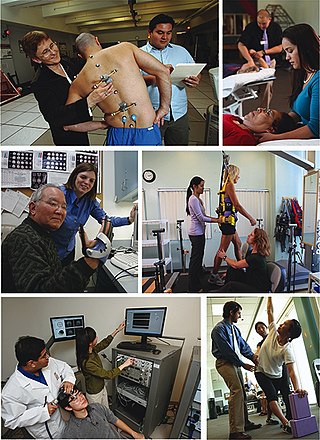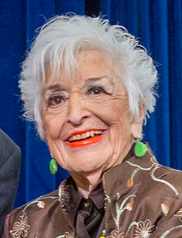
Assistive technology (AT) is a term for assistive, adaptive, and rehabilitative devices for people with disabilities and the elderly. Disabled people often have difficulty performing activities of daily living (ADLs) independently, or even with assistance. ADLs are self-care activities that include toileting, mobility (ambulation), eating, bathing, dressing, grooming, and personal device care. Assistive technology can ameliorate the effects of disabilities that limit the ability to perform ADLs. Assistive technology promotes greater independence by enabling people to perform tasks they were formerly unable to accomplish, or had great difficulty accomplishing, by providing enhancements to, or changing methods of interacting with, the technology needed to accomplish such tasks. For example, wheelchairs provide independent mobility for those who cannot walk, while assistive eating devices can enable people who cannot feed themselves to do so. Due to assistive technology, disabled people have an opportunity of a more positive and easygoing lifestyle, with an increase in "social participation", "security and control", and a greater chance to "reduce institutional costs without significantly increasing household expenses." In schools, assistive technology can be critical in allowing students with disabilities to access the general education curriculum. Students who experience challenges writing or keyboarding, for example, can use voice recognition software instead. Assistive technologies assist people who are recovering from strokes and people who have sustained injuries that affect their daily tasks.

Parasports are sports played by people with a disability, including physical and intellectual disabilities. Some parasports are forms of adapted physical activities from existing non-disabled sports, while others have been specifically created for persons with a disability and do not have a non-disabled equivalent. Disability exists in four categories: physical, mental, permanent and temporary. At a competitive level, disability sport classifications are applied to allow people of varying abilities to face similar opposition.

Accessibility is the design of products, devices, services, vehicles, or environments so as to be usable by people with disabilities. The concept of accessible design and practice of accessible developments ensures both "direct access" and "indirect access" meaning compatibility with a person's assistive technology.

Kinesiology is the scientific study of human body movement. Kinesiology addresses physiological, anatomical, biomechanical, pathological, neuropsychological principles and mechanisms of movement. Applications of kinesiology to human health include biomechanics and orthopedics; strength and conditioning; sport psychology; motor control; skill acquisition and motor learning; methods of rehabilitation, such as physical and occupational therapy; and sport and exercise physiology. Studies of human and animal motion include measures from motion tracking systems, electrophysiology of muscle and brain activity, various methods for monitoring physiological function, and other behavioral and cognitive research techniques.
Universal design is the design of buildings, products or environments to make them accessible to people, regardless of age, disability, or other factors. It emerged as a rights-based, anti-discrimination measure, which seeks to create design for all abilities. Evaluating material and structures that can be utilized by all. It addresses common barriers to participation by creating things that can be used by the maximum number of people possible. “When disabling mechanisms are to be replaced with mechanisms for inclusion, different kinds of knowledge are relevant for different purposes. As a practical strategy for inclusion, Universal Design involves dilemmas and often difficult priorities.” Curb cuts or sidewalk ramps, which are essential for people in wheelchairs but also used by all, are a common example of universal design.

The Rehabilitation Act of 1973 is a United States federal law, codified at 29 U.S.C. § 701 et seq. The principal sponsor of the bill was Rep. John Brademas (D-IN-3). The Rehabilitation Act of 1973 replaces preexisting laws to extend and revise the authorization of grants to States for vocational rehabilitation services, with special emphasis on services to those with the most severe disabilities, to expand special Federal responsibilities and research and training programs with respect to individuals with disabilities, to establish special responsibilities in the Secretary of Health, Education, and Welfare for coordination of all programs with respect to individuals with disabilities within the Department of Health, Education, and Welfare, and for other purposes. It created the Rehabilitation Services Administration.
Rehabilitation engineering is the systematic application of engineering sciences to design, develop, adapt, test, evaluate, apply, and distribute technological solutions to problems confronted by individuals with disabilities. These individuals may have experienced a spinal cord injury, brain trauma, or any other debilitating injury or disease. Functional areas addressed through rehabilitation engineering may include mobility, communications, hearing, vision, and cognition, and activities associated with employment, independent living, education, and integration into the community.
The National Institute on Disability, Independent Living, and Rehabilitation Research (NIDILRR) is a United States governmental agency that provides leadership and support for a comprehensive program of research related to the rehabilitation of individuals with disabilities. It was previously The National Institute on Disability and Rehabilitation Research, a subordinate of the Office of Special Education and Rehabilitative Services (OSERS) — part of United States Department of Education.

Rehabilitation International is an international disability rights organization with member organizations in every region of the world. The RI secretariat is located in New York City.
Psychiatric rehabilitation, also known as psychosocial rehabilitation, and sometimes simplified to psych rehab by providers, is the process of restoration of community functioning and well-being of an individual diagnosed in mental health or emotional disorder and who may be considered to have a psychiatric disability.
Assistive technology service providers help individuals with disabilities acquire and use appropriate Assistive Technology (AT) to help them participate in activities of daily living, employment and education.
Supported employment refers to service provisions wherein people with disabilities, including intellectual disabilities, mental health, and traumatic brain injury, among others, are assisted with obtaining and maintaining employment. Supported employment is considered to be one form of employment in which wages are expected, together with benefits from an employer in a competitive workplace, though some versions refer to disability agency paid employment. Companies such as Skilcraft in the United States are an example of "supported employment" which is defined in law for state and federal reimbursements.

The Rehabilitation Council of India (RCI) is the apex government body, set up under an Act of Parliament, to regulate training programmes and courses targeted at disabled, disadvantaged, and special education requirement communities. It is the only statutory council in India that is required to maintain the Central Rehabilitation Register which mainly documents details of all qualified professionals who operate and deliver training and educational programmes for the targeted communities. In the year 2000, the Rehabilitation Council of India (Amendment) Act, 2000, was introduced and notified consequently by the government of India. The amendment brought definitions and discussions provided within the earlier Rehabilitation Council of India Act, 1992, under the ambit of a larger act, namely, Persons with Disabilities Act, 1995.
Community integration, while diversely defined, is a term encompassing the full participation of all people in community life. It has specifically referred to the integration of people with disabilities into US society from the local to the national level, and for decades was a defining agenda in countries such as Great Britain. Throughout recent decades, community integration programs have been increasingly effective in improving healthcare access for people with disabilities. They have been valued for providing a "voice for the voiceless"

The California Department of Rehabilitation (DOR) is a California state department which administers vocational rehabilitation services. It provides vocational rehabilitation services and advocacy from over 100 locations throughout California seeking employment, independence, and equality for individuals with disabilities. The DOR was established on October 1, 1963.

The National Institute of Speech and Hearing (NISH) is an institute devoted to the education and rehabilitation of individuals with speech-language and hearing impairments located in Thiruvananthapuram, the capital city in the Indian state of Kerala. It was established in 1997 on the initiative of the state of Kerala and is a self-financing affiliate college of the University of Kerala. Academics at NISH is unique in the sense that NISH has an integrated campus where students with hearing impairment and students with normal hearing share the same campus. Bachelor's level courses exclusively for students with hearing impairment include Degree courses in Fine Arts, Computer Science and Commerce affiliated to University of Kerala. On the other hand, NISH also provides RCI approved professional courses at undergraduate level and graduate level in Audiology and Speech Language Pathology as well as diploma courses affiliated to Kerala Health University (KUHS)
The overall prevalence of people with disabilities is 4.52% of the population, i.e., 63.28 million, according to the ICMR's publication from the NFHS-5 survey 2019-21. India is a party to the United Nations Convention on the Rights of Persons with Disabilities. Legislation that affects people with disabilities in India includes the Rights of Persons with Disabilities Act, 2016, the Mental Health Care Act, 2017, the National Trust Act, 1999, and the Rehabilitation Council of India Act, 1992. People with disabilities in India are faced with negative social attitudes in the wider population.

Individuals with disabilities are more susceptible to contracting COVID-19 and have higher mortality rates compared to those without disabilities. This is particularly true for people with intellectual and developmental disabilities, those residing in care facilities, and women with disabilities. Individuals with disabilities face heightened risks of mental health issues related to the pandemic, such as increased feelings of loneliness and isolation. They were also more likely to face domestic violence and abuse during the pandemic. People with disabilities are more likely to experience unemployment as a result of the pandemic and may require changes to the types of accommodations they require for work. Children with disabilities experience complications in their educational programming. Remote learning poses a host of challenges for children with disabilities, including disruptions to physical and occupational therapies and access to assistive technologies.

Margaret Joan Giannini was an American physician and a specialist in assistive technology and rehabilitation. She was the first director of the National Institute of Disability Rehabilitation Research (NIDRR).











